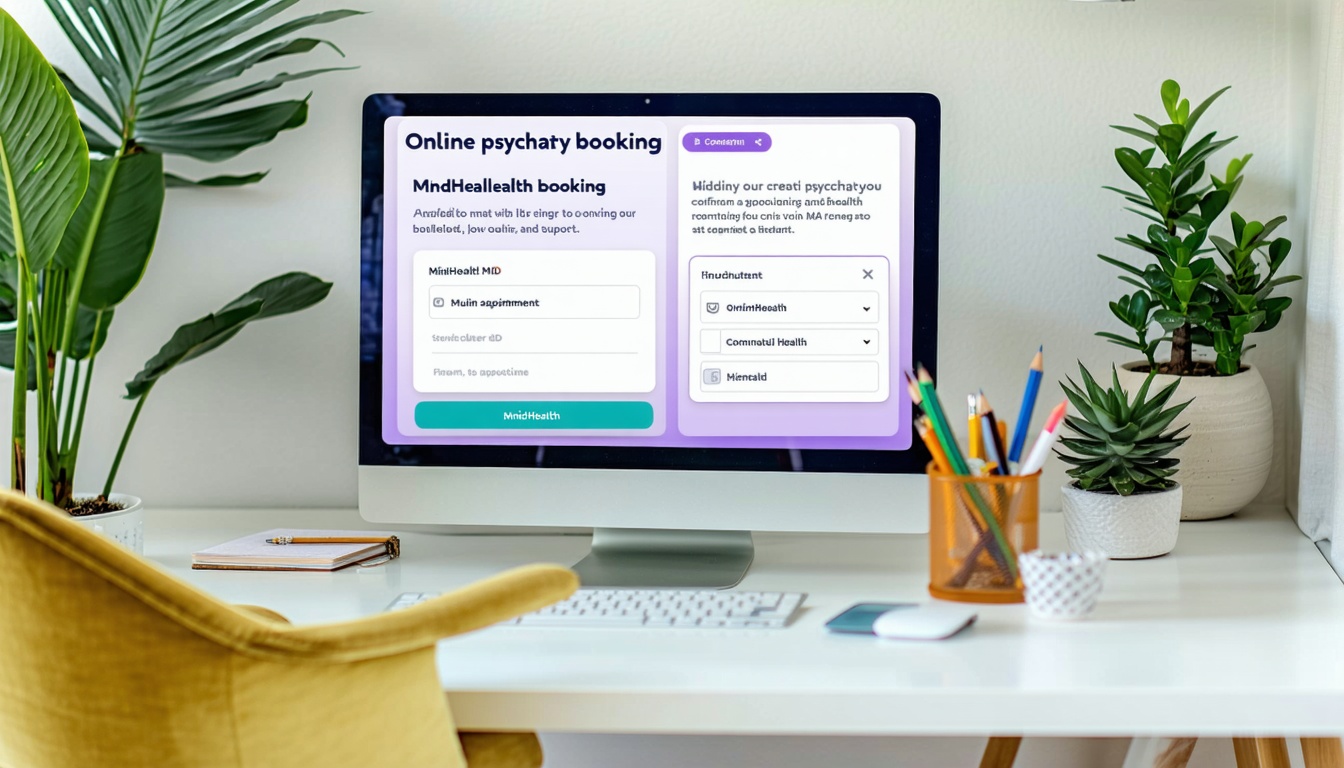Recognize post discharge psychiatry care
Post discharge psychiatry care is a structured follow-up plan that supports you once you leave the hospital or psychiatric unit. This care is all about guiding you through the transition back to daily life, helping you stay on track with your mental health, and preventing avoidable setbacks. In fact, around 30% to 50% of individuals admitted to psychiatric units do not attend their post-hospitalization appointments within 30 days, and this gap can lead to serious consequences, such as relapse and even homelessness [1].
You might already sense why this matters: your journey doesn’t end the day you walk out of the hospital. By having consistent clinical check-ins and mental health evaluations, you give yourself (or your loved one) the best shot at maintaining stability and avoiding emergency room visits or repeated hospital admissions.
Understand risks of skipping follow-up
When you skip scheduled psychiatric follow-up after leaving inpatient care, you increase your risk of unwanted outcomes that affect every aspect of life. These can include:
-
Heightened Suicide Risk
Post-discharge patients are especially vulnerable in the first three months. Some studies indicate the suicide rate can be up to 100 times greater than the global average in this timeframe [2]. -
Relapse and Readmission
If you’re coping with a disorder like major depression, bipolar disorder, or schizophrenia, missing early outpatient appointments can lead to symptom flare-ups, which often trigger new hospital stays. -
Homelessness or Legal Troubles
Without timely mental health support, it’s easy to be overwhelmed by daily challenges. In extreme cases, this can escalate to housing instability or encounters with the criminal justice system [1]. -
Financial Strain
Repeated admissions put a huge burden on you and your family financially. It also strains healthcare resources, which is why insurers and hospital systems emphasize a solid discharge plan to reduce costs in the long run.
By recognizing these risks, you can appreciate the importance of sticking to your post-discharge appointments and following a personalized care plan that suits both your clinical needs and your home environment.
Discover essential discharge steps
No single approach works for everyone, because every person’s mental health story is unique. Still, certain steps have been shown to improve outcomes if they’re implemented right at the time of admission and updated throughout your hospital stay [3]. Here are a few key components:
Initial discharge meeting
Right after you’re admitted, a discharge meeting should ideally be scheduled to discuss longer-term needs. This session might involve you, a psychiatrist or psychiatric nurse, and possibly your family members or close friends. It’s a chance to:
- Talk about your immediate post-hospital goals.
- Outline potential community resources (like local clinics).
- Check what kind of care support you may want once you go home.
Regular discharge reviews
Your healthcare team should update the plan as you progress. If you need a shift in medication, specialized therapy, or additional community resources, this is when to bring it up. Unexpected changes in your condition don’t have to throw you off. Instead, you can adjust your discharge plans together with your care professionals.
Personalized leaving day checklist
Before your final day in the hospital, it helps to have a simple checklist. Make sure it includes:
- Contact information for your psychiatrist or therapist.
- Prescription refills and a written medication list.
- A scheduled follow-up appointment date.
- Emergency or crisis hotlines in case urgent help is needed.
Completing this checklist can help you walk out of the hospital feeling more organized and ready for what lies ahead.
Overcome common barriers
If post discharge psychiatry care is so beneficial, why do nearly half of discharged patients not use it? It turns out that several obstacles stand in the way.
Limited access or time conflicts
Some people live in areas with few mental health providers. Others juggle work, school, and family duties that make attending appointments tough. In these scenarios, you can benefit from a telepsychiatry appointment that brings you face to face with your provider over a secure video call. This option saves time on commuting and can help you manage care from the comfort of home.
Financial pressures
Sometimes, worry about costs keeps people from scheduling follow-ups. Seek out clinics or programs that offer insurance accepted psychiatry, so you can reduce the expense of ongoing treatment. If insurance coverage is still an issue, discussing a self pay psychiatry session with a transparent pricing plan may be more manageable.
Stigma and fear
Mental health stigma remains a big hurdle. You or your loved one might feel ashamed or afraid of being judged. If this fear holds you back, it may help to connect with peer support groups or family counselors. Having a compassionate friend or family member accompany you to appointments can also alleviate the stress.
Unclear expectations
Sometimes, patients feel unsure of what is expected post-discharge, especially if they haven’t been given clear instructions for medication or future appointments. Make sure your discharge plan is in writing, with every step outlined in straightforward language. If anything remains unclear, talk to your care team immediately.
See how MindHealth MD helps
Knowing how critical timely follow-up is, you might wonder why you should choose MindHealth MD for your ongoing mental wellness journey. MindHealth MD is built around the idea that individualized, convenient, and evidence-based care offers the best shot at long-term stability.
Below are a few ways MindHealth MD stands out:
-
Telehealth psychiatry options
At MindHealth MD, you can schedule a secure virtual psychiatry session that matches your busy schedule. No more wasting gas on a trip across town or missing work; you meet with a qualified professional using your computer or smartphone. -
TMS therapy and specialized services
If you’re dealing with stubborn depression that hasn’t responded to medication, our tms therapy for depression may provide a new solution. It uses noninvasive, targeted magnetic pulses to help regulate the parts of your brain responsible for mood. Backed by robust research, TMS is a powerful option to discuss with your treatment team. -
MAT for opioid and alcohol dependency
Medication-assisted treatment (MAT) has proven to be a game-changer for people struggling with substance use. With medication assisted treatment, MindHealth MD assigns a licensed mental health practitioner to help you integrate medication, therapy, and additional support. Whether it’s mat for opioid addiction or mat for alcohol dependency, you can access strategies tailored to your specific needs. -
Comprehensive coverage
Many potential patients worry about insurance coverage. MindHealth MD focuses on in network psychiatry care, so you can pursue treatment without worrying too much about excessive out-of-pocket costs. If you want to confirm your coverage, consider contacting us to see how we can help you stay within your plan. -
Flexible scheduling
A mental health crisis can strike out of the blue. That’s why we strive to offer same day psychiatric evaluation or even a 48 hour psychiatry booking to ensure you never feel left behind. If you need to book a session in a hurry, options for immediate psychiatry appointment are also available.
MindHealth MD aims to simplify your follow-up care. The overarching goal? Ensuring a smooth return to everyday life while still keeping your healing journey on track.
Plan your medication management
Medication management can be a game-changer for post discharge psychiatry care. Research shows that non-adherence to antipsychotic medication often leads to relapse and readmission within a short period [4]. Proper medication supervision can help you remain stable and reduce the need for inpatient readmissions.
Tips for success
- Keep a medication log: Write down your doses, times, and any side effects you notice. This log helps you and your healthcare team spot patterns or issues quickly.
- Set reminders: Use phone alarms or pillbox organizers, especially if you have multiple prescriptions.
- Stay in touch: If side effects or new symptoms arise, contact your care provider promptly. Changing or adjusting a dose can sometimes improve your comfort and overall progress.
- Monitor progress: Ask about scheduling a psychiatric medication management appointment if you’re on a complex regimen. This can keep everything running smoothly.
Coordinated care teams
Medication management is a team effort. Alongside your psychiatrist, you may work with nurses, social workers, or peer counselors who ensure you’re taking the right dose at the right time. If you’re facing co-occurring conditions such as depression and substance use, a co occurring disorders treatment plan that includes medication management might keep both issues in check.
Advanced diagnostics
Sometimes, more thorough assessments can shed light on how your brain is functioning post-discharge. That’s where advanced services, like an eeg brain mapping test or an eeg diagnostic for mental health, can become useful. These specialized tests provide deeper insight into your condition, helping your care team customize medication and therapy to fit your exact profile.
Review five common questions
Below are five frequently asked questions about post discharge psychiatry care. Each answer is based on authoritative research or tried-and-true clinical experience.
-
What exactly is post discharge psychiatry care?
Post discharge psychiatry care refers to the follow-up plan designed to support your mental health recovery once you leave a psychiatric unit or hospital. This can involve therapy, medication management, check-ins with a psychiatrist, and specialized services like TMS or MAT. -
Why is it important to schedule follow-up within 30 days?
The first month after discharge is a critical period. Studies show that 30% to 50% of individuals fail to attend even one appointment during this time, which puts them at higher risk for relapse or readmission [1]. A follow-up within that window helps catch red flags before they become crises. -
Can telehealth really replace in-person visits?
Telehealth can be highly effective. It offers more convenience and—especially for anyone living in a remote area or juggling a busy schedule—makes compliance easier. Services like a virtual psychiatry session often incorporate video calls, digital therapy modules, and remote symptom tracking. -
What if I can’t afford regular follow-up?
Exploring insurance accepted psychiatry is a great first step. If that’s not an option, you can look for a self pay psychiatry session with transparent pricing structures. Some communities also offer low-cost or sliding scale programs if you meet certain income requirements. -
How does MindHealth MD set itself apart from other providers?
MindHealth MD’s approach is comprehensive. You can schedule everything from book psychiatric appointment to advanced procedures like schedule tms treatment or specialized therapies like medication assisted treatment. The practice also focuses on quick access to care—offering same day psychiatric evaluation when you need it most.
By embracing post discharge psychiatry care, you’re taking an important step toward mental wellness and preventing future hospital stays. You don’t have to figure everything out on your own. With solid guidance, consistent scheduling, and an eager support team, your transition from inpatient treatment to independent living can be smoother than you’d think.
If you’re considering timely help or want to dive deeper into your therapy options, MindHealth MD is here to guide you. Whether it’s a quick online psychiatry booking, a plan for treatment resistant depression care, or an urgent check-in, you (or your loved one) won’t have to take these next steps alone.
You owe it to yourself to keep those follow-up appointments and build the support system that suits your life. After all, effective discharge planning isn’t just another step in recovery—it’s the bridge between crisis management and living a healthier, more confident life.
References
- (PubMed)
- (NCBI)
- (PubMed Central)
- (PMC)








